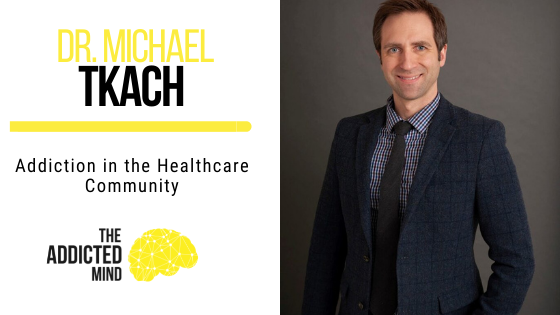We cannot overstate the impact this pandemic has had on our health care providers. When you think about all the stress and pressures these frontliners are going through day in and day out, you can see how a lot of aspects are playing in that are leading to clinical burnout and, ultimately, addiction. Yet, we need to recognize that this is just a part of a larger system that’s going on in the individual.
On this episode, Duane talks with clinical psychologist Michael Tkach as he shares about addiction and other issues that healthcare workers are facing during these COVID times. A clinical psychologist by training, Michael is the Chief Operating Officer and Chief Behavioral Health Officer for Affinity Empowering, a technology-based solutions provider that supports overall health and wellness endeavors and that has also become a major provider of COVID-19 testing.
Michael recently conducted research on medical care providers who are providing care to individuals diagnosed with terminal illnesses. What was highlighted in the research was a sense of powerlessness. These providers have no power to change the course of the etiology of the disease and they’re left with no other option but to simply manage the disease.
Michael was drawn into the mental health field after growing up in a neighborhood with a high prevalence of addiction as well as death by suicide. He eventually ended up at Hazelden Betty Ford for postdoctoral residency and then later came on staff there holding a variety of different roles.
At Affinity Empowering, they think about how people engage in health care and how they can affect change with addiction and mental health in general.
Today, Michael shares his expertise and wisdom about addiction treatment and how we can help individuals struggling with addiction, especially our frontline healthcare workers who are working so hard to provide the best care they can under extremely difficult circumstances. If you’re a healthcare worker out there struggling, please reach out for help so you can get the support you need.
In this episode, you will hear:
- Looking at addiction from a much larger scope
- Clinical burnout caused by a sense of powerlessness
- The perfect storm of many social supports not being there
- The lack of social support when people are looking to reduce stress and disengage
- How alcohol sales have increased during the pandemic
- The overlapping Venn diagram of prevalence between traumatic experiences and substance use
- Getting in-person support vs. virtual support
Key Quotes:
[05:23] – “The way that I approach addiction and addiction treatment is how all of those factors coalesce and come into a single point to affect the individual rather than trying to be reductionistic.”
[09:26] – “When we start looking at what happened with COVID and how places were overwhelmed, what you started seeing is that clinical burnout that goes along with that feeling of helplessness.”
[13:39] – “A lot of times, we think of addiction as a disease state that really thrives in isolation, people have shame. They hide it, they want to downplay how much they’re using.”
[14:38] – “During the beginning of the pandemic, globally from April to June of 2020, alcohol sales increased over 34% to the year prior.”
[18:15] – “There are those traumatic experiences where people are talking about loss, they’re talking about those experiences and those pressures to keep going that leads towards burnout.”
[18:25] – “There is this overlapping Venn diagram of prevalence between traumatic experiences and substance use.”
[23:53] – “As much as we love to think that therapy is therapy and supportive support, it is a different skill set to do it virtually than to do it in person.”
Subscribe and Review
Have you subscribed to our podcast? We’d love for you to subscribe if you haven’t yet.
We’d love it even more if you could drop a review or 5-star rating over on Apple Podcasts. Simply select “Ratings and Reviews” and “Write a Review” then a quick line with your favorite part of the episode. It only takes a second and it helps spread the word about the podcast.
If you really enjoyed this episode, we’ve created a PDF that has all of the key information for you from the episode. Just fill in your information below to download it.

